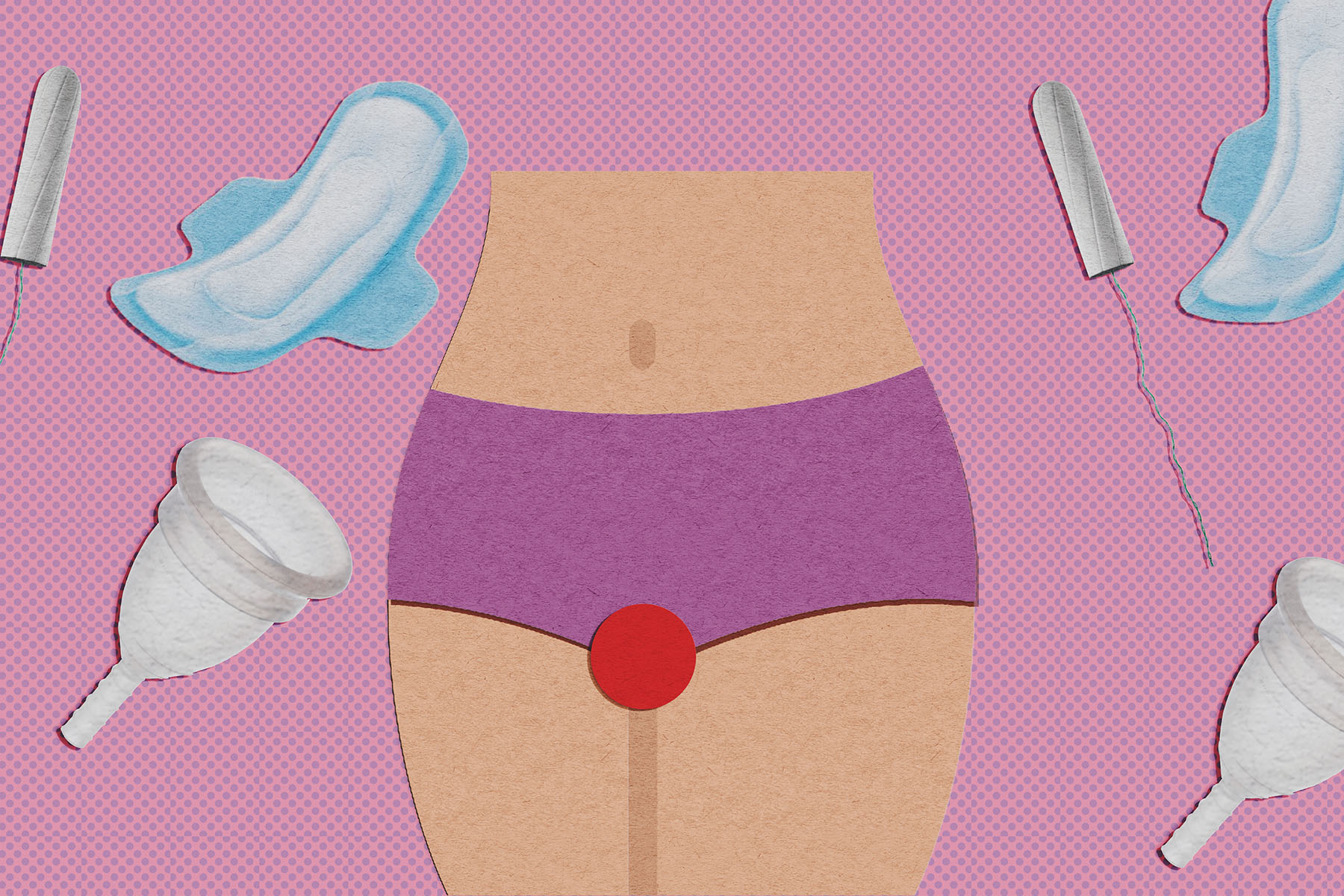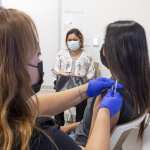Sriya Srinivasan stopped menstruating for nearly three years and had no idea why. She went online for answers, and the search results frightened her so much that she stayed silent about the problem instead of asking relatives or teachers for help.
“I was searching on the internet for, ‘Where’s my period?’ What is going on?’” said the 16-year-old from Solano County, California. “It told me that I was dying in different ways, whether that was ovarian cancer or I had a tumor. I didn’t want anyone else to be as scared as I was during that time, so that’s why I hid it.”
Finally, a doctor’s visit for an unrelated issue revealed the culprit, a medical condition that she’d like to keep private. But Srinivasan has been public about how little she knew about the menstrual cycle before hers came to a halt. Now through the state’s citizen-led legislative process, she’s championing legislation that would mandate that California’s public middle and high schools expand the definition of comprehensive sexual health education to include menstrual health.
With such a shift, Assembly Bill 2229 would close what its bipartisan backers call a “curriculum gap.” Current sex ed instruction focuses on pregnancy, contraception and sexually-transmitted infections but not explicitly on menstrual health. The legislation also acknowledges the importance of teaching students about a wide range of topics related to the menstrual cycle such as premenstrual syndrome, menstrual disorders, menstrual stigma and menopause. Advocates would like the bill, which to date has passed the California State Assembly and is moving through the Senate, to have a ripple effect across the country. Virginia and Washington, D.C., have already passed similar legislation.
“I think it’s really important to reduce shame and help people understand their bodies,” said Assemblywoman Lori Wilson, a Democrat and the bill’s primary sponsor. “Everybody should be learning about this, so I hope that nationwide, this is a thing. I hope that this is something that our federal partners get on board with.”
Last fall, Srinivasan started a Change.org petition about including menstrual health education in California public schools. She also submitted the idea to the “There Oughta Be A Law” contest by which California legislators accept policy proposals from their constituents. Training with the nonprofit Advocates for Youth — which fights for sexual health, rights and justice — helped her view herself as a youth advocate capable of creating change, she said. Srinivasan has appreciated her experiences leading the Solano Reproductive Health Club at Solano Community College, where she participates in a dual enrollment program as a high school student. The club was involved in the launch of the Know Your Period Campaign, along with students across California, to advocate for AB 2229.
When Wilson received Srinivasan’s “There Oughta Be A Law” proposal, she was struck by the teenager’s ordeal. Her submission beat out ideas from over 300 other constituents.
“She actually didn’t realize that she was severely ill and that she needed medical care,” Wilson said. “She eventually got medical care, but then when she was talking with her friends about it, all of them were talking about how they didn’t know about menstruation and they hadn’t learned about it in school. So when she presented the bill to us, it was just really impactful.”
Research indicates that teenagers throughout the United States would welcome changes to menstruation education. “State of the Period 2023” — a study commissioned by the period underwear company Thinx Inc. and the advocacy organization PERIOD: the Menstrual Movement — found that 78 percent of teens agree that menstrual health education should be a part of a school’s core curriculum. Yet 78 percent of teens also say they learn more about the inner workings of frogs than of women’s bodies. Seventy-six percent of teens say they would appreciate frank communication about their menstrual cycles but feel that periods are a verboten topic at school. The study found that Hispanic and lower-income students were most likely to say that they have experienced stress related to managing menstruation at school and that society teaches people to be ashamed of having a period. Public relations firm SKDK surveyed 1,020 teenagers between the ages of 13 and19 and 1,050 adults between the ages of 20 and 50 online September 5-10, 2023.
“Menstrual health education is something that has been lacking for years — for centuries,” said Damaris Pereda, national programs director for PERIOD. “Often, people only learn what their family or people in their community may share with them. Often, menstrual health education is not taught in schools or not taught extensively in schools; it’s kind of mentioned. And all of this has really contributed to the continued stigma we see.”
Many people know how to manage periods with pads and tampons but are uneducated about menstrual disorders, menstrual irregularities or menopause, Pereda added. In 2021, California was widely applauded for passing the Menstrual Equity for All Act, requiring public schools to provide free pads and tampons to students. At the time, there were no immediate plans to give students in the state a comprehensive menstrual health education.
Pereda applauds the current effort to make such education a requirement in California schools. If AB 2229 passes, she anticipates that it will influence other states to adopt similar policies. The Golden State, the nation’s most populous, enjoys what experts have described since the 1970s as “The California Effect,” meaning that its policies set the benchmark nationwide.
“Once California does any changes, big shifts in education, and in any aspects, it does have a ripple effect around the country,” Pereda said. “We have full trust that this is going to impact the rest of the country, and I’m really excited about increasing menstrual health education. Imagine where our students will be in 10 years in terms of accessibility and education.”

There are already signs that menstrual health education is becoming a priority nationwide. In April, Virginia passed legislation giving school boards the authority to allow it to be taught in the health education curriculum for students in grades 4 to 8. Taking effect on July 1, the law is not as broad as California’s pending legislation, since school boards may prohibit or limit such instruction.
In the nation’s capital, the Council of the District of Columbia passed the Expanding Student Access to Period Products Act of 2022. The law not only requires schools to equip students with menstrual products, but it also outlines standards to improve menstrual health education for students starting in the fourth grade, regardless of their gender. The legislation’s passage made Washington, D.C., the nation’s first jurisdiction to enact menstrual education guidelines. One of the topics covered in the curriculum is when students should seek medical care for a menstrual concern, subject matter that likely would have benefited Srinivasan.
Wilson is hopeful that California will soon follow in the footsteps of Washington, D.C. Given how many stories she’s heard about people’s ignorance concerning menstruation, the assemblywoman contends that education is overdue.
“There was one young girl who testified about PMS, and she said, ‘I didn’t even know what that was. I thought it was when guys call you angry,’” Wilson said. “PMS — that’s a real thing. Learning is power. There shouldn’t be a stigma around menstrual health. Male, female, it doesn’t matter who you are, you should be well versed in it.”
Srinivasan said that her classes have not prepared her well. In fifth grade, she received minimal education about menstruation that focused more on the anatomy than it did on practical information such as how to use tampons or pads. It did not address why menstruation is perceived to be an off-limits subject. Boys and girls were separated for the lesson, which she suspects stigmatized the topic even more. Eighty-five percent of teens say that everyone, whether or not they have periods, should learn about the menstrual cycle, according to the “State of the Period 2023.” In seventh and ninth grade, Srinivasan took sex education classes, but they did not address menstruation, she said.
In retrospect, Srinivasan does not doubt that she would have sought help when her period first stopped had her school exposed her to menstrual health education.
“If that had occurred, I would have been comfortable enough to say, ‘I’m having issues with my period. Somebody help me,’” she said. Going to school in an environment where students who discuss menstruation are ridiculed or criticized made it difficult to speak up. “It makes it harder for individuals to actually talk about their periods because it seems somehow taboo,” she said. “So, of course, if this education was there, and I knew about it, I would have been able to ask for further clarification and support.”
Whether or not AB 2229 is enacted, Srinivasan views the impetus behind it as greater than any one piece of legislation.
“AB 2229 isn’t just a bill,” she said. “It’s a movement, and it’s a campaign to address the education that students haven’t been able to access for so many years. Even past the bill, we will continue to fight.”







